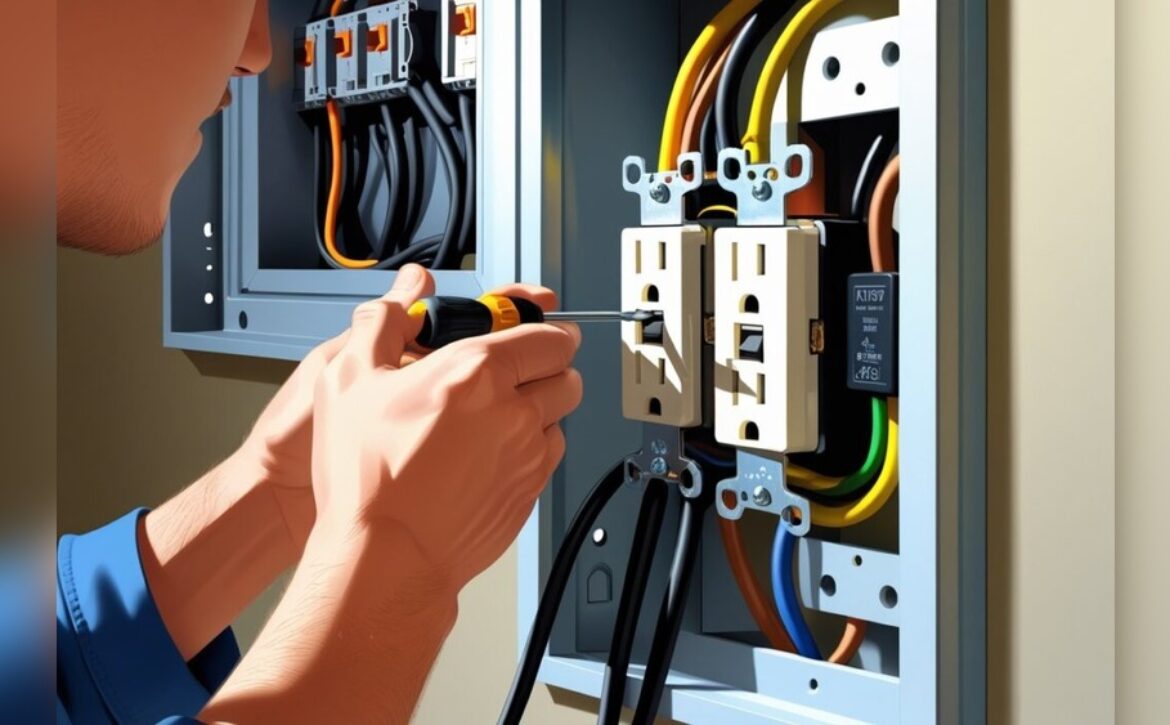
How to Become a Basic Electrician Course: Step-by-Step Guide
Are you curious about how electricity powers your home? Do you find yourself tinkering with gadgets or fixing small electrical issues?
If so, becoming a basic electrician might be the perfect career path for you. With the right skills and knowledge, you can transform your interest into a rewarding profession. This article will guide you through the essential steps and tips for enrolling in a basic electrician course.
You’ll discover how to gain the expertise and confidence needed to succeed in this field. Imagine being able to solve electrical problems with ease, ensuring safety and efficiency in every project you tackle. Dive in to learn how you can start your journey towards becoming a skilled electrician. Your future in this electrifying field awaits!
Understanding The Role Of An Electrician
Understanding the role of an electrician is crucial before starting a course. Electricians are skilled professionals who ensure electrical systems work safely. They install, maintain, and repair electrical systems in homes and businesses. Knowing what electricians do helps you decide if this career suits you.
Understanding The Work Environment
Electricians work in diverse settings. Homes, factories, and construction sites need their expertise. They often work indoors and outdoors. Weather conditions can affect outdoor jobs. Safety gear is essential for protection. Understanding the environment helps prepare for the job’s demands.
Key Responsibilities Of An Electrician
Electricians have several key tasks. Installing wiring and lighting is common. They also troubleshoot electrical issues. Reading blueprints and technical diagrams is necessary. Electricians ensure systems comply with safety codes. This protects people and property from electrical hazards.
Importance Of Safety In Electrical Work
Safety is a top priority for electricians. Handling electricity is risky. Proper safety measures prevent accidents. Electricians use tools and safety equipment. They follow strict safety guidelines. Understanding these practices is vital for a safe work environment.
Skills Needed To Excel As An Electrician
Electricians need various skills. Technical knowledge is crucial. Problem-solving skills help in troubleshooting. Good communication is important for teamwork. Physical fitness is needed for manual tasks. Continuous learning keeps electricians updated on new technologies.

Essential Skills For Electricians
Embarking on a journey to become an electrician is an exciting endeavor. It’s a career that demands a unique blend of skills, each essential to successfully navigate the challenges you’ll face. Understanding these skills is crucial, whether you’re just starting out or looking to refine your abilities. Let’s explore the core competencies that will set you apart in the field of electricity.
Technical Proficiency
Technical proficiency is at the heart of being an electrician. You must be comfortable with a range of tools and equipment. Knowing how to use a multimeter or wire strippers efficiently can make a big difference in your daily tasks. Familiarize yourself with electrical codes and safety standards to ensure you’re always working safely and legally.
Are you ready to delve into intricate wiring systems? Understanding circuit diagrams and electrical schematics is vital. It’s not just about connecting wires; it’s about knowing why each connection matters. Building this technical foundation will make troubleshooting and installations more intuitive.
Problem-solving Abilities
Electricians are often faced with unexpected challenges. How do you tackle an issue when a circuit isn’t functioning as expected? Problem-solving skills are your best friend here. Approach each problem with an analytical mindset. Break it down into smaller parts and assess each component.
Have you ever been stumped by a tricky wiring issue? This is where creative thinking comes into play. Sometimes the solution isn’t obvious, and you’ll need to think outside the box. Practice makes perfect, so continually expose yourself to diverse scenarios to sharpen these skills.
Attention To Detail
An electrician’s work demands precision. A single loose connection can lead to major issues down the line. Do you pay attention to the smallest details? Ensuring each wire is correctly placed and each component is securely fastened is critical.
Your meticulous nature can prevent costly mistakes and enhance safety. Double-checking your work might seem tedious, but it’s a habit that can save lives. Cultivate a mindset that values thoroughness in every task you undertake.
Physical Stamina
Electricians often work in physically demanding environments. Are you prepared for long hours standing, bending, or lifting heavy equipment? Physical stamina is necessary for handling the rigors of the job without compromising quality.
Working in tight spaces or at heights requires both strength and endurance. Regular exercise and maintaining a healthy lifestyle will keep you agile and ready for whatever the job throws your way. Your physical health is as crucial as your technical expertise.
As you consider a career in electricity, reflect on these skills. Are there areas you feel confident in, or skills you need to develop further? Understanding your strengths and weaknesses will guide you on a path to becoming a proficient electrician. Ready to take the next step? Let’s get started!
Educational Requirements
Embarking on a journey to become a basic electrician begins with understanding the educational requirements. You don’t need to have a high-flying degree to start this rewarding career. Instead, your focus should be on acquiring essential knowledge and skills through foundational education and practical coursework. But what exactly does that entail?
High School Diploma
Your first step is obtaining a high school diploma or equivalent. This qualification is your ticket to most electrician training programs. It proves you have basic math, science, and communication skills—critical components for your future career.
Consider this: Do you remember solving algebra problems in school, wondering when you’d ever use them? As an electrician, you’ll find yourself regularly calculating voltage, current, and resistance. Those math lessons suddenly become relevant.
While a diploma is crucial, it’s also a chance to develop a strong work ethic. Attending school daily and completing assignments diligently lays the groundwork for the discipline needed in electrician training.
Relevant Coursework
High school is also an opportunity to enroll in courses that align with electrical work. Classes in physics and mathematics are particularly beneficial. Understanding the principles of electricity and energy is vital.
If your school offers vocational courses like electronics, jump at the chance. They provide hands-on experience that can be more engaging than purely theoretical studies. Imagine the thrill of building a simple circuit and seeing it work—it’s a glimpse into your future as an electrician.
Outside the classroom, consider joining clubs that focus on science and technology. Engaging in projects can hone problem-solving skills and ignite passion. Do you enjoy working with your hands or tinkering with gadgets? These interests could fuel your success as an electrician.
Educational requirements are not just about ticking boxes; they shape your future career. What steps will you take today to ensure you’re ready for electrician training tomorrow?
Choosing The Right Electrician Course
Choosing the right electrician course is a crucial step towards a successful career in the electrical industry. With numerous options available, you might wonder what factors to consider. Here, we’ll break down key aspects that can help guide your decision.
Accreditation Importance
Accreditation should be at the top of your checklist. An accredited course ensures that the program meets industry standards and provides quality education. It can significantly impact your career prospects, as employers often prefer candidates from accredited programs.
Imagine yourself walking into a job interview, and the hiring manager asks about your training. Wouldn’t you feel confident knowing your course is recognized by industry authorities? Always check the accreditation status before enrolling.
Course Content
The content of the course is equally important. Look for courses that cover essential topics like electrical safety, wiring techniques, and circuit theory. Comprehensive course content prepares you for real-world challenges.
Consider what skills you want to acquire. Do you want a solid understanding of residential wiring or a more specialized focus like solar panel installation? Make sure the course aligns with your career goals.
Hands-on Training
Hands-on training can set you apart from other candidates. Practical experience allows you to apply theoretical knowledge and develop problem-solving skills. It’s one thing to learn from books, but dealing with live circuits is a different ball game.
Think back to a time when you learned by doing. Did the experience solidify your understanding? Seek out courses that offer extensive lab sessions or fieldwork opportunities to enhance your learning.
Choosing the right electrician course is like building the foundation of your career. What course will help you shine in the electrical world?
Enrolling In A Basic Electrician Course
Starting a career as an electrician begins with the right education. A basic electrician course provides essential skills and knowledge. This course covers wiring, safety practices, and electrical codes. It is a great stepping stone for anyone new to the field.
Enrolling in the course is the first step towards a brighter future. Below, we discuss how to apply and explore financial aid options.
Application Process
The application process is straightforward and simple. Begin by researching schools or training centers offering the course. Check their entry requirements and deadlines carefully.
Next, gather necessary documents like proof of identity and educational qualifications. Some schools may require a background check or drug test. Fill out the application form accurately and submit it before the deadline.
After submission, wait for confirmation. If accepted, you will receive details about the course schedule and start date.
Financial Aid Options
Education can be costly, but financial aid can help. Many schools offer scholarships or grants to eligible students. Check if you qualify and apply early, as funds might be limited.
Federal aid is another option, and many students find it helpful. Visit the official FAFSA website to apply and understand eligibility criteria. Some schools also offer payment plans to spread the course cost.
Seek advice from the school’s financial aid office. They can provide guidance tailored to your financial situation. With the right support, affording the course becomes manageable.
Gaining Practical Experience
Gaining practical experience is crucial for aspiring electricians. It bridges the gap between theoretical knowledge and real-world application. Practical experience enhances skills, boosts confidence, and provides valuable insights into the trade. By engaging in hands-on learning, future electricians can refine their abilities and prepare for a successful career.
Apprenticeship Programs
Apprenticeship programs offer structured training and real-world experience. They combine classroom instruction with on-the-job training. Participants learn under the guidance of experienced electricians. This mentorship is invaluable for skill development and knowledge application. Apprenticeships typically last several years, allowing for comprehensive learning. Upon completion, apprentices are well-prepared for certification exams.
Internship Opportunities
Internships provide another avenue for gaining practical experience. They are usually shorter than apprenticeships but still valuable. Interns work alongside professionals, observing and assisting with tasks. This exposure helps them understand industry standards and practices. Internships can also lead to job offers, enhancing career prospects. They are an excellent way to apply classroom knowledge in real situations.
Preparing For Certification Exams
Preparing for certification exams requires focus and dedication. Start by reviewing course materials thoroughly. Practice with sample questions to understand the exam format. Allocate time wisely to cover all topics. Joining study groups can provide support and enhance understanding. Regular breaks help maintain concentration and reduce stress.
Preparing for certification exams is a crucial step in your journey to becoming a basic electrician. These exams test your understanding of electrical principles and ensure you’re ready to handle real-world scenarios. Success requires strategic preparation, using the right resources, and registering effectively. Let’s dive into how you can ace these exams and move closer to your electrician goals.
Study Resources
Gathering the right study materials is key. Start with textbooks recommended by your course instructors. They often contain the most relevant information for your exams. Online platforms like Khan Academy and Coursera offer electrical courses that can supplement your learning. These resources often include quizzes and interactive modules to test your knowledge. Join study groups or forums where you can discuss challenging topics. It’s surprising how much you can learn by explaining concepts to others or hearing different perspectives. What study method has helped you best understand complex topics?
Exam Registration
Ensure you’re aware of the registration deadlines and requirements for your certification exams. Missing deadlines can delay your progress significantly. Most exams require pre-registration through official websites. Visit these sites regularly to stay updated on any changes in exam schedules or requirements. Consider registering for practice exams if available. They’re a great way to familiarize yourself with the test format and time constraints. How confident are you in your test-taking skills? Practicing can boost your confidence and improve your performance. Preparing thoroughly for certification exams is not just about passing; it’s about equipping yourself with the skills needed to excel in your career. Prioritize your study resources and stay organized during registration to ensure a smooth experience.
Career Opportunities For Electricians
Embarking on a journey to become a basic electrician offers a plethora of career opportunities. These roles are not just limited to fixing wires and circuits; they open doors to diverse pathways in various sectors. As you gain experience and skills, you can decide which niche resonates with your passion and goals. Let’s dive into some exciting career opportunities you might explore.
Residential Electrician
Residential electricians focus on home electrical systems. Imagine stepping into a freshly built house, with the chance to design the electrical layout from scratch. It’s an opportunity to ensure families live safely and comfortably. You’ll deal with installations, repairs, and upgrades, making home environments better.
Think about the satisfaction of seeing a family enjoy their newly lit living room or a perfectly wired kitchen. It’s not just about the technical skills; it’s about enhancing everyday life. As a residential electrician, you have the power to impact people’s homes directly.
Commercial Electrician
Commercial electricians work in business settings. From shopping malls to office buildings, they handle complex electrical systems. It’s a role that demands precision and adaptability, as commercial environments have unique electrical needs.
Imagine the thrill of wiring a new restaurant or ensuring a tech company’s server room is perfectly equipped. These tasks require strategic thinking and problem-solving skills. You’ll be a key player in supporting businesses to run smoothly and efficiently.
Industrial Electrician
Industrial electricians operate in factories and manufacturing plants. It’s a challenging field that involves maintaining and repairing heavy machinery and equipment. Your role will be crucial in keeping production lines running without a hitch.
Picture yourself ensuring a factory’s conveyor belts are functioning seamlessly or troubleshooting a complex machine. This career path offers a chance to work with advanced technologies and systems. It’s about ensuring industries keep moving forward without downtime.
As you consider these career paths, ask yourself: which environment suits your skills and interests? Whether it’s residential, commercial, or industrial, each offers unique experiences and challenges. What impact do you want to make in your career as an electrician?
Continuing Education And Advancement
Continuing education and advancement are crucial in the journey to becoming a proficient electrician. As technology evolves, so too does the electrical field, requiring professionals to stay updated. This section is your guide to expanding your skills and ensuring you remain competitive in the industry.
Advanced Certifications
Once you’ve mastered the basics, consider pursuing advanced certifications. They can open doors to higher-paying jobs and leadership roles. Certifications like the Certified Electrical Safety Technician (CEST) or the Electrical Engineering Technician (EET) can enhance your credibility.
Why settle for average when you can be exceptional? Advanced certifications allow you to tackle complex electrical systems confidently. Remember, the more you know, the more valuable you become in the workplace.
Specialization Areas
Electricians have the option to specialize in various areas such as renewable energy, industrial systems, or home automation. Each offers unique challenges and rewards. Specializing can make your skills more sought-after and your work more fulfilling.
Consider what excites you most about electrical work. Are you passionate about sustainable energy solutions? Or do you prefer the intricacies of smart home technology? Choosing a specialization can transform your career from a job to a passion.
Think about the future—where do you want your career to be in five years? Specializing can be your ticket to achieving those dreams, providing both personal satisfaction and professional success.
Ultimately, continuing education is not just about gaining more knowledge; it’s about strategically positioning yourself to advance in your career. Are you ready to take the next step?


Frequently Asked Questions
What Qualifications Do You Need To Start?
To start an electrician course, you typically need a high school diploma or equivalent. Basic math and science skills are beneficial. Some programs may require entrance exams. Research specific course prerequisites to ensure you meet all requirements. This foundational knowledge will prepare you for the technical aspects of the training.
How Long Does An Electrician Course Take?
An electrician course can take anywhere from a few months to four years. Duration depends on the program type, whether it’s a certificate, diploma, or degree. Apprenticeships usually last four years. Shorter programs offer quicker pathways to entry-level positions. Consider your career goals when choosing a course duration.
Can I Take Electrician Courses Online?
Yes, many institutions offer online electrician courses. These programs cover theoretical knowledge through virtual classes. However, practical experience is crucial, so ensure the course includes hands-on training. Check if the course offers lab sessions or partnerships for practical exposure. Online learning provides flexibility but requires self-discipline.
What Skills Will I Learn In This Course?
In a basic electrician course, you’ll learn electrical theory, safety protocols, and circuit design. You’ll also gain skills in wiring, troubleshooting, and using electrical tools. Courses often include hands-on training for practical experience. These skills are essential for performing electrical installations and repairs effectively.
Conclusion
Completing a basic electrician course opens doors to new opportunities. This journey equips you with essential skills and knowledge. You gain confidence to handle electrical tasks safely. Practical experience is key. It prepares you for real-world challenges. Employers value certified electricians.
Your career prospects improve significantly. Stay curious, keep learning. The electrical field evolves rapidly. Continuous education is crucial. Basic training is just the start. Dive into the world of electricity. Discover the endless possibilities ahead. Your future in this field looks bright.
Take the first step today. Start your electrician journey with confidence.





